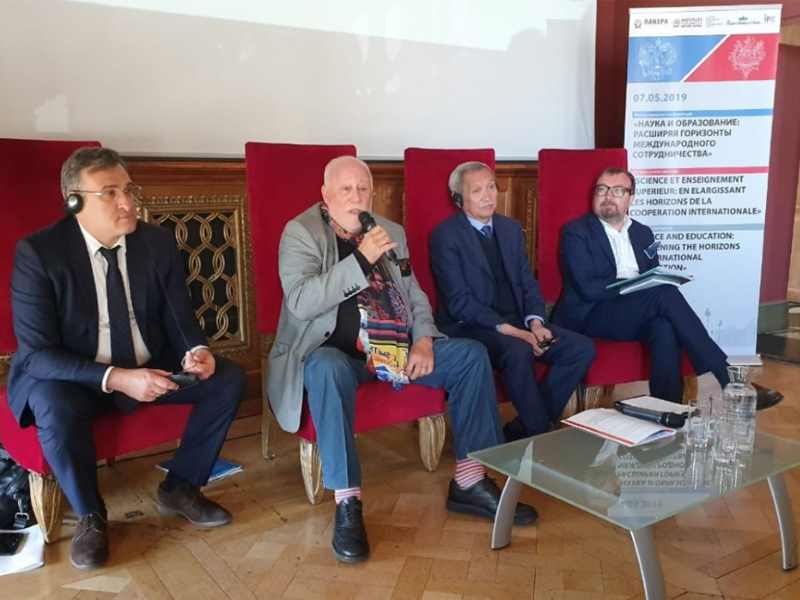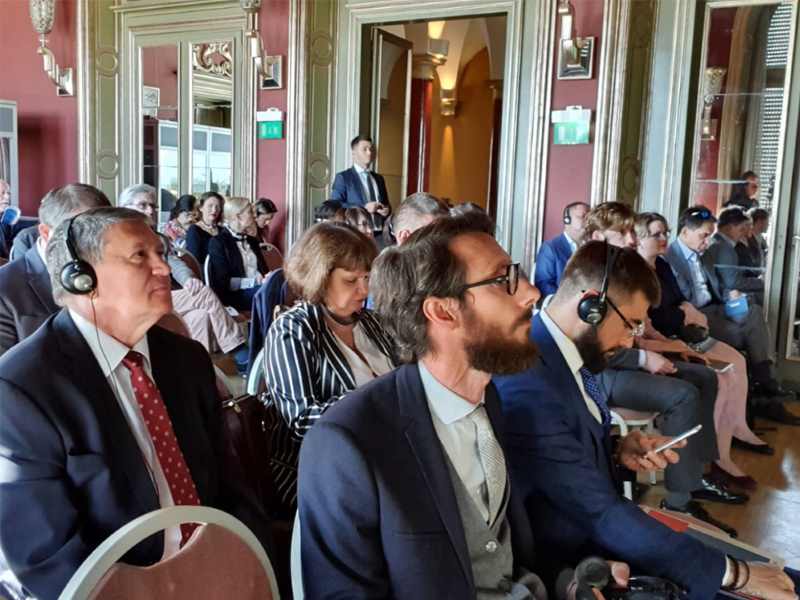Stakeholders discuss cooperation in research and education at an international conference in France
The conference, Science and Education: Expanding the Horizons of International Cooperation, was held in Nice, France, on May 7; RANEPA was involved in organizing the event.
The organizers of the traditional May meeting of Russian and foreign academics and university workers included the Presidential Academy, in particular, RANEPA Institute of Public Administration and Civil Service (IPACS). The University of Nice Sophia Antipolis was a partner of the conference on the French side.
RANEPA Rector Vladimir Mau, President of the Russian Academy of Sciences Alexander Sergeyev and President of the University of Nice Sophia-Antipolis Emmanuel Tric greeted the participants of the plenary session, Science and Education: The Role of Universities in the Development of Smart Cities. The discussion was moderated by Igor Bartsits, Director of the RANEPA IPACS, and Vice President of RAS Maxim Safonov.
Kirill Bykov, Science and Technology Counselor of the Russian Embassy in France, set the tone for the discussion, underscoring that contacts in the field of science and education between the two countries are highly relevant, especially considering the current economic restrictions. Over the past four years, tremendous work has been done to expand academic exchanges; an agreement has been signed on the mutual recognition of degrees and education certificates at all levels, and the Russian-French Network University has been established (RANEPA is a member). The next stage of cooperation should include major joint infrastructure projects, the speaker said.
All current problems are beyond the boundaries of individual states and scientific disciplines; they cannot be resolved within one country and require an interdisciplinary approach, said Riccardo Valentini, a professor at the University of Tuscia, Italy, a winner of the 2007 Nobel Peace Prize. “We need to think about establishing research centers where scientists from different countries and scientific schools will jointly create a new system. And we should start right here, with education, because students are the greatest wealth of our world. We must learn and teach students to see the challenges of our time not as problems, but as opportunities,” Professor Valentini said. This idea was supported by Alexander Dvorkin who represented the Council on Youth Affairs under the Patriarch of Moscow and All Russia. He said a university of the future “is a cycle where a person comes to gain knowledge and become a citizen.”
Igor Bartsits proposed thinking about the concept of digital society. In his opinion, “all things digital” carry a heavy ethical burden. IT-based educational technologies will develop, and the EdTech market is projected to reach $240 billion by 2020. With the growing digitalization, the very mission of universities will be changing. The human factor will grow ever more important – the professor’s personality will be the only thing that keeps a student in. According to statistics, only 15% of students working for their degrees online actually get them, while 85% leave the race. “This format of learning works for adults who make informed choices and are highly motivated. For young people, education should be more complex,” said Mr. Bartsits. Until recently, it was believed that digitalization and the internet would reduce inequality and make education accessible to all. But new inequality emerged as a current trend and a key philosophical question. “Fifty years ago, 10-15% of high school graduates went on to college. Today their share is 70-80%, and we are moving towards universal higher education, its quality becomes questionable. A full-time university education is still a higher level because it includes socialization and is based on the professor’s personal charisma,” the speaker said.
Director of the Russian-French Center for Education and Consulting at RANEPA IPACS, Professor Yelena Ponomarenko believes that online technologies improve the quality of education and attract more foreign students. “Programs in areas of study where our country has world recognition enjoy a particular competitive advantage. Russia now ranks fourth after France (third place) in promoting online education,” she explained. “It is just important that, having mastered all digital technologies, universities should not lose their human face,” Igor Bartsits continued.
According to Director of the Russian Academy of Sciences’ Institute for System Programming Harutyun Avetisyan, online education improves the general level of education in a country, but it cannot produce results without elite education. Studying online is simply about technology, but the modern world faces more complex problems. “It is impossible to speak about science, education, or innovation as an isolated phenomenon: only by combining them ca we achieve elite education. Flexibility of thinking, adaptability and deep knowledge are the only competitive advantages today,” he said. Mr. Avetisyan was supported by Leonid Altukhov, President of the Netkom-IPC Group of Companies: “A modern employer needs workers who can think, learn and perceive the world in its diversity, without blinkers on, able to adapt to information overload.”
Smart City depends on education
Chairman of the Board of Directors of the Russian Technology Foundation Dominique Fache opened the session, Smart City: New Standard of Decision-Making. In his opinion, the industry of the 21st century is the industry of the mind. Success depends on initiatives, on their level, and strategies must be constantly updated and should expand to education. “The cooperation of universities is necessary, but their partnership with industry is no less important,” said Mr. Fache. “Culture becomes a factor of development and life. The problems of modernity are not solved with weapons; they are solved through energy, science, and universities. Education and science can rebuild bridges destroyed by politics.”
Nur Kirabayev, first vice-rector for research at the Peoples’ Friendship University, said friendship between peoples is a true and very important value, and cooperation supports the interests of all parties to the interaction. Leonid Altukhov added that Smart City begins with people: “This idea of collecting all intellectual systems into a single bigger one implies the ability to integrate and automate all information and databases.” Serge Miranda, Professor at the University of Nice Sophia Antipolis, proposed viewing universities as places for creating new opportunities: “A student, a city resident, and a tourist are participants of the one data space, and this space is going to change the reality. Nice must become a Smart City in culture.”
Pierre Bordeaux, lecturer and researcher at Paris 12 University, CEO of Apex International, said that urban development requires not only business strategies, but also consideration the community’s interests. Consumers can provide useful information for urban development, that is, decisions must be adapted to their interests. “The reality of cities is multifactorial; universities play a central role in their development as hubs for information collection and analysis. Universities also provide social cohesion; science and research as part of joint programs and projects become the engine of progress that we all are striving for,” the expert concluded.
Co-chairman of the Moscow Center of Urban Studies Alexei Raskhodchikov began his presentation with a question: “Fifty percent of Russians live in megalopolises – is this a spontaneous process or a managed one?” Megacities create an unfavorable environment to live in, and Smart City is an attempt to solve this problem and make the city comfortable and convenient. Smart City involves smart management, technology and community, but no one talks about the smart community. Urban transformations should be permanent, depending on the interests of the residents. Ideally, it is up to the residents to draft a strategy for change. The urban environment always generates conflict. So, the voice of a citizen is not heard amid the clamor of business, government, and developers. That is why the role of education is so important today – it shapes the community. True Smart Cities are those that can change and develop in the interests of the people.
The final session of the conference was devoted to an innovative ecosystem. Experts agreed that digitalization and the resulting ecosystem serve the development of human capital. The customers for technology are people, and without creating a respective ecosystem it is impossible to talk about development. To respond to the modern challenges, we need to close ranks and implement infrastructure projects together, according to scientists and representatives of the academic community.




